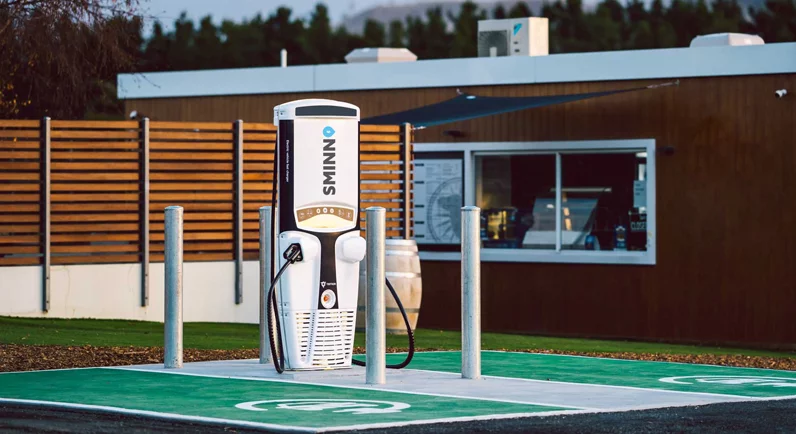
Electromobility and Norwegian Grants
MARTEL Trade, s.r.o. | budget: EUR 747 165.00

Clean electro charging
This project is currently being implemented.
The project aims to create a system/solution for obtaining green energy from a renewable source (the sun) thanks to photovoltaics, which will work on an inverter - energy from the sun directly into the car and/or storing the energy from the sun in a battery (storage) and then transferring it to the electric vehicle.
The project focuses on the development of an innovative technological solution for electric chargers, which will consist of a synergy of three innovative elements:
• Production of "clean energy" charging stations - a photovoltaic solution for powering electric vehicles
• Energy management system: intelligent power management and energy storage of the charging station
• "User-friendly" application (cloud base): covering charging station network options and data
The project will result in technological and ecological innovation of charging stations for electric vehicles, thanks to the synergy of individually functioning solutions into a comprehensive product - a product line, with the aim of reducing the environmental burden of the entire life cycle of electric vehicles. The applicant MARTEL Trade s.r.o., together with the project partner MARTEL Sminn, s.r.o., are both members of the MARTEL group, which is dedicated to innovative solutions in the field of electricity. Specifically, MARTEL Trade s.r.o. focuses on photovoltaic systems and their implementation, while MARTEL Sminn, s.r.o. focuses on the development of solutions for electromobility. The third project partner, UNITE, s.r.o., focuses on developing software solutions, and was invited to the project based on its long-standing cooperation with the MARTEL Group.







The idea and its formulation
The cooperation started based on friendly relations and previous collaborations. The MARTEL Group approached us with the idea of developing an innovative product line of electro-chargers and their subsequent introduction into a real operating environment. The innovativeness of the electro-chargers lies in the use of clean, green energy from solar radiation - photovoltaics - and at the same time offers a partial solution to unwanted waste - worn-out electric car batteries, which are recycled, i.e., re-used, as a storage of the solar energy, obtained in the project.







Grant
The grant program and the grant call itself were searched for concerning the innovative and ecological solid dimension of the project plan and its possible broad impact. Once again, the current pan-European priorities, which focus on reducing CO2 in the air and developing alternative fuels in transport, played positively into our hands. Considering the potential of the project plan, we were looking for the most appropriate challenge/call. The call BIN 01 from EEA grants, also known as "Norway Grants," came out as the most suitable for this project. EEA grants are a Norwegian financial mechanism based on an agreement between the Kingdom of Norway as a contributing state, and the Slovak Republic, as a beneficiary state. This contribution aims to reduce social and economic disparities within the EEA (European Economic Area) and strengthen mutual relations. The call itself focused on Green Innovation in Industry.







Project execution
After several working meetings with the project partners, clarification of electromobility issues, and project plan details, we started to develop the grant application. This process consists of processing the information gathered from the client and the available verified data into the grant application itself. The project budget is prepared after the logistics and text parts are completed. The budget is again based on the initial data from the partners and our experience from previous projects, i.e., how to set it up to be as advantageous as possible for the smooth implementation of the project. At the same time, we also prepared the necessary mandatory annexes of the application, and the partners approached and acquired premises for the location of the test electro-chargers.







Project implementation
The project is currently in the implementation phase, where it has been contracted, and the partners have started work on the individual development parts of the electro-chargers. Subsequent to their development, electro-chargers will be tested in an operational environment. We, as an agency, are starting to work on implementing the RFP, where the subject will be a marketing campaign for the commercialization of the product line of electro chargers, to position them on the market and attract advertising partners. The project also includes conferences to promote awareness of the project and the Norwegian grant opportunities, within which the first Opening Conference for the project was already held online.









Our comment
Since the beginning of the cooperation, there has been friendly and open communication between the project partners and us (a consulting agency), making the whole collaboration much more effortless. Budgetary changes have been communicated and resolved to the benefit of all parties involved. When further additions were made prior to signing the project contract by the Research Agency (as the intermediary body), there was also a willingness to resolve/clarify ambiguities, which overall simplifies the implementation process. Also, due to this approach, the project partner MARTEL Sminn, Ltd. approached us for cooperation for their next project plan in the field of electromobility.